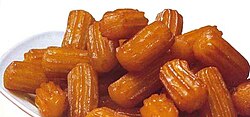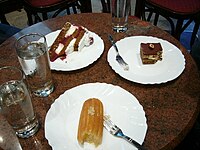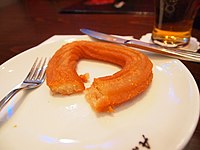Tulumba
Dessert common to Iran and the former countries of the Ottoman Empire From Wikipedia, the free encyclopedia
Tulumba or Bamiyeh (Persian: بامیه; Arabic: بلح الشام) is a deep-fried dessert found in Egypt, the Levant, Turkey and the regional cuisines of the former Ottoman Empire. It is a fried batter soaked in syrup, similar to jalebis or churros. It is made from unleavened choux pastry dough (usually about 3 cm long) piped with a pastry bag using an open star or similar tip. It is first deep-fried to golden colour and then sugar-sweet syrup is poured over it when still hot. It is eaten cold.
This article needs additional citations for verification. (June 2019) |
 Tulumba | |
| Alternative names | balah ash-sham (Arabic: بلح الشام) |
|---|---|
| Type | Dessert |
| Place of origin | Egypt, Syria, Ottoman Empire |
| Region or state | Egypt, Balkans, Middle East, South Caucasus |
| Main ingredients | Flour, butter, salt, water, syrup, vanilla extract |
Name
Tulumba literally means 'pump' in Turkish, deriving from the Italian tromba. The dessert is called pomba in Cypriot Greek and bombacık in Cypriot Turkish. In Armenian cuisine it may be called either pomp or tulumba (Armenian: թուլումբա). Tulumba features in Albanian, Serbian, Bosnian, Bulgarian, Macedonian, Greek, (Greek: τουλούμπα), Romanian, Azeri (Azerbaijani: Ballıbadı) and Turkish cuisines. The sweet is also found in Persian cuisine as bamiyeh (Persian: باميه), after the vegetable of the same Persian name (okra), due to its shape. In Hejazi it is called ṭurumba (Arabic: طُرُمْبَة) directly from Italian: tromba, but in Egyptian and some Arab cuisines it is called balaḥ ash-Shām (Arabic: بلح الشام), literally "Syrian dates" or "Damascene dates," though the name may have come from "şambali", another Turkish dessert (the "Şam" in "şambali" corresponding to "Shām" in "balaḥ ash-Shām" and both referring to Damascus). In Iraqi cuisine it is known as datli (Arabic: داطلي), directly coming from Turkish word tatlı.
Main ingredients
It is made from a yogurt[citation needed] and starch based dough, which is fried before being dipped in syrup. It is a special sweet often enjoyed at Iftar in Ramadan.[1] It is also commonly sold alongside jalebi, which is prepared in a similar way, but arranged in a web-like arrangement of strips of dough.
Gallery
- Tulumba
- Tulumba with kaymak and pistachio
- Tulumba cross-section (front)
- Round
- Spiral shape
- Two pieces of shape (Twisted round).
See also
References
External links
Wikiwand - on
Seamless Wikipedia browsing. On steroids.






